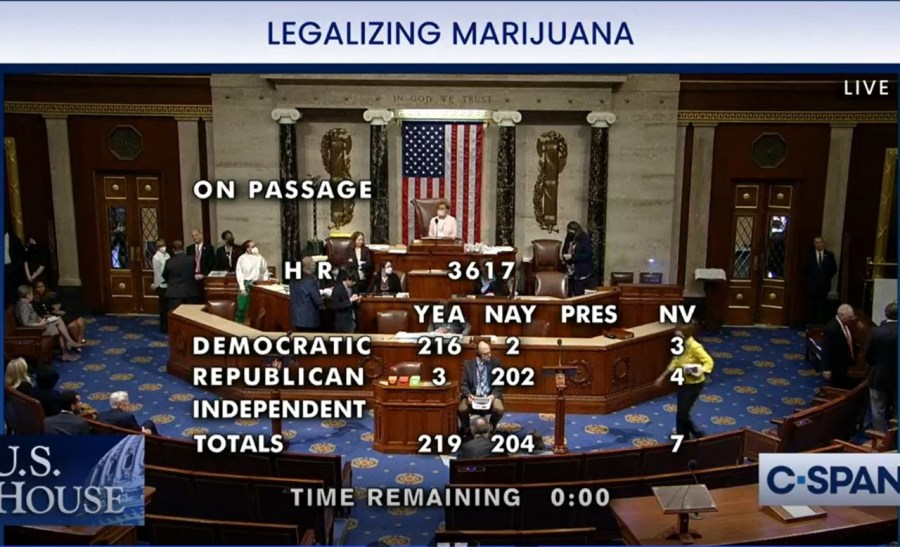PORTLAND, Ore. (KOIN) — On Friday, the House passed a bill that would legalize marijuana on a national level — but what could this mean for states like Oregon, which already have legal cannabis industries?
Following the House approval of the Marijuana Opportunity Reinvestment and Expungement Act, also known as the MORE Act, local lawmakers held a virtual media availability on Friday. At the media availability, they championed the victory and discussed the potential impacts for the 18 states which have already legalized the substance recreationally.
The meeting, led by Congressional Cannabis Caucus Co-Chairs Representative Earl Blumenauer (OR-03) and Representative Barbara Lee (CA-13), included statements from industry advocates and Chairman Jerry Nadler, who introduced the bill on May 28, 2021.
Although today marks the bill’s second passage and the legislation still faces a tough vote in the senate, Blumenauer said he is hopeful the MORE Act will move forward.
“This is a historic event,” Blumenauer began. “We, of course, passed the MORE act in the house before, but this time it’s different. Unlike before when we passed the MORE Act, where it would be languishing in the Senate with a very hostile Senate Republican leadership, there’s been a sea change. We have three dedicated Senate champions, Leader Schumer, Chairman Wyden [and] Cory Booker leading the charge in the Senate, and we fully expect to see legislation introduced there.”
Blumenauer went on to address statements made on the floor by his fellow Oregonian colleague, Rep. Cliff Bentz, who strongly opposed the bill and stated that its passage would likely exacerbate the illegal marijuana grows, illicit cannabis sales and human trafficking incidents seen in his district of Southern Oregon.

“When Cliff Bentz from Oregon talked about some of the problems in Southern Oregon, I totally agreed with him,” Blumenauer stated. “But they are the result of a failure of the federal government to actually have a coherent policy.”
He went on to say Chairman Nadler has put together a “blueprint for the federal government to be a positive partner, to be able to make progress, to be able to deal with these challenges and to stop having the federal government trip over itself and get in the way –- which they have done.”
Beyond legalizing marijuana, if passed by the MORE Act would expunge former marijuana convictions and reduce current marijuana sentences, in addition to ensuring people could no longer lose federal benefits or immigration status due to marijuana activity.
According to Maritza Perez, the director of the Office of National Affairs at the Drug Policy Alliance, the Congressional Budget Office estimated the MORE Act could reduce amount of time served by nearly 73,000 years for existing and future incarcerated people between 2021 and 2030.
However, the Oregon market may feel the impact of the initial 5% federal excise tax on marijuana sales proposed by the bill.
The tax slated to be at the manufacturer level would be used to fund programming and social services in communities most harmed by the war on drugs and promote equity and diversity in the marketplace.
“This legislation is critical to help the states that are in the forefront of this,” Blumenauer stated. “We’re in the forefront in terms of the first to decriminalize and to legalize but we’re paying the price of a lack of consistent federal policy.”
According to the congressman, the bill would also help address major safety concerns for legal marijuana workers in states like Oregon, who currently lack access to fair banking and have consequently become easy targets for theft and robbery.
“We passed the Safe Banking Act and that is incorporated into the MORE legislation, but it has not yet taken place,” Blumenauer explained. “This is a way to stop having dispensaries be sitting ducks for robbery. It’s an opportunity to help minority businesses that are struggling have access to financial tools, and it gives us a chance to strip away the federal interference for research for greater access to medical marijuana. ”
He continued to say that “we need the MORE act to be able to take advantage of the promise of the legislation that we passed back in 2014.”

During her comments Friday, Rep. Lee said the caucus and champions of this bill would hold the federal government accountable for not overstepping rights and privileges within legal cannabis markets, which have already been approved at the state level.
“The anxiety of people in this business, and the worry and fear that the Federal government is going to vamp on them,” Lee said. “We want to send a clear message that we are going to have a laser focused oversight on what the federal government is doing in states that have passed all of these reforms.”
She added, “They [legal marijuana workers] should be able to legitimately do their business and everything their states have previously authorized for them.”
When media members pointed out Lee and Blumenauer’s fellow cannabis caucus co-chair, Republican Congressman David Joyce, voted against the MORE Act on Friday, Blumenauer responded by acknowledging that there are still areas for growth and improvement.
“I think we’re going to get there, but there’s a broad array of things that we need to work on,” the congressman said. “Medical cannabis, research, some economic and tax reform — there’s no end to the areas that we can work on together.”
He added that he appreciated Joyce’s leadership and “the fact that he’s evolved on this issue,” saying and he’d like continue working with him “to evolve a little further.”
Although the bill passed by a vote of 220-204, with a few Republicans favoring the bill, Nadler said for the legislation to pass the Senate, the team will have to do the “hard work necessary to persuade them.”
The next vote will be tougher though, as the MORE Act will need 60 votes in the Republican-led Senate before the bill can move to President Joseph Biden’s desk for a signature. Until then, the lawmakers who championed the bill are briefly celebrating the victory in Washington today, as they end their week on a “high-note”
“Having a federal framework that puts everybody on an even scale and being able to have a more powerful and consistent federal partnership will actually help states like Oregon,” Blumenauer said. “Having a modest federal tax helps us be able to deal with some of the problems with the tax inequity. Now this is the first step to being able to rationalize it and in the long run, we’re going to be much better off.”
